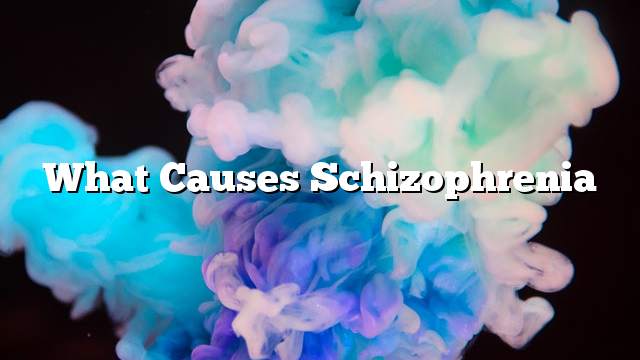Schizophrenia
Dispersion is a common term for many, but it is not usually understood correctly. Most people have misconceptions about this condition, such as that a patient has double or divided personalities and behaves as two separate personalities, or he may be a person Violent and frightening, and other predictions about the disease, and therefore may not be understood in its proper scientific sense.
Definition of schizophrenia
Schizophrenia is a group of concurrent psychological symptoms that usually appear on the person before the age of forty and lead to deterioration in his personality and behavior; so that he has an abnormal way of thinking and his view of what is around him, and controlled by the skeptical ideas unrealistic, and appear to be emotional Conflicting, socializing, and distancing itself from its surroundings.
Spread of schizophrenia
Schizophrenia usually occurs at an earlier age in men than in women. While emotional symptoms appear more often in women, the symptoms of schizophrenia are more common in women than men, However, disorders of the nervous system and the brain and the lack of adaptability, and the number of times of recurrence and severity of more frequent in men than in women.
Symptoms of schizophrenia
There are a number of symptoms experienced by people with schizophrenia, including:
- Change in the way of thinking and acting; so that the patient psychologically does not distinguish the difference between reality and imagination.
- Hallucinations and illusions, and prepares the patient to hear voices or see things that are not real.
- Disorders of thinking and inability to put ideas in the appropriate mental sequence, and this appears in the patient’s talk and words, he may say words or sentences are not linked together.
- Movement disorders such as stopping the patient from moving completely for long hours, for example.
- Changes in the patient’s emotional behavior, signs of isolation or what may appear to be depression.
- Do not show facial expressions such as smile or anger.
- Lack of desire to practice life and fulfill its requirements such as shopping or work.
- Inability to pay attention.
- Inability to make a decision.
Causes of schizophrenia
Scientists have not identified a cause for schizophrenia; they have analyzed and analyzed some of the factors that may lead to the disease.
Genetics
The studies that diagnosed the cases of disease proved the role of genetic readiness in the infection of this disease through three aspects:
- Genetic data in the family tree: The presence of a satisfactory history in the small or extended family tree gives an indication of the increased likelihood of infection, but this hypothesis is not quite accurate for the extended family to the difficulty of ascertaining the history of grandparents, and if there was an injury did not confirm whether the injury of schizophrenia injury or disease from another type.
- Genetic data in twins: The studies of twins are important studies in showing the role of the genetic factor and its impact on disease, and these studies have shown that identical twins increase the proportion of a person in schizophrenia if his twins matched the disease higher than the twins are not identical.
- Adoption data: The scientists studied the cases of children who were isolated, adopted and removed from their parents with schizophrenia. They compared them with children who were also adopted but from healthy parents who did not have schizophrenia. These studies confirmed the role of heredity in the disease when researchers found that of the thirty-nine adoptive children with one of their parents Of the chizoverna, 13 of them were older and were infected with the disease or were in a state of borderline between mental health and illness, compared with forty-nine children from healthy parents, of whom only seven had the disease or showed a borderline between mental health Of the disease, although the studies such as “Copenhagen study” demonstrated that the prevalence of genetically larger five-fold when a group disease categories compared to a group of healthy and sound categories but environmental factors also a significant role can not be ruled out.
Environmental reasons
There are a number of factors that are exposed to the individual may lead to schizophrenia in the case of a genetic predisposition to the disease, and these factors divided into categories, including:
- Family atmosphere: Where this factor took a wide range of study and attention; because the disease is in adolescence and youth, and man at this stage closer in dealing with his family from the outside environment, and thus the family role in shaping his personality and thinking, and divided into two parts: The other part has shown that some injuries occur in non-troubled families and therefore is not a measure of injury. However, the role of the family is evident after the person has become more ill, not as a cause but as a key factor. They are healing factors and help the patient and his support to overcome the disease.
- Relationship between child and mother: The impact of depriving the child of the mother’s tenderness was a great deal of study and attention, and while many stressed that the disturbance of the relationship between the mother and the child and the loss of attention, tenderness and care needed by his mother may adversely affect him and be a catalyst for his schizophrenia when he grows up, others criticized this hypothesis As the case that there are cases of injury to one of the children does not get brothers from the same mother, and the supporters of this theory that the synchronization of childhood at the time of family crisis or divorce or depression in the mother may affect the child who lived these crises fell without his brothers For those of these crises have not Azamnoa or stages or coexist with it.
